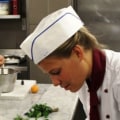Food service and related positions generally have no formal education or work experience requirements. Agri-food systems are at the heart of at least 12 of the 17 United Nations Sustainable Development Goals (SDGs) by 2030. However, food services include food preparation, table preparation, event planning, cleaning, reception, and everything in between. Sustainable food chains must operate in a way that exploits and optimizes the synergies between environmental protection, social equity and economic growth.
Much of this experience comes from the quality of the food, but the rest comes from the atmosphere in the front of the house and the attitude and quality of service of the waiters. The broad scope of the SDGs requires holistic approaches that integrate previously “isolated” food sustainability assessments. Academic qualifications and passion may lead you to a job as a chef, but your skills will determine your success. In the following example, you can see how the candidate emphasizes their “vegetarian cooking skills”.
When it comes to skills, this section plays a supporting role for the skills section by showing not just your skills. The best-laid plans are often sabotaged by a food environment that makes it increasingly difficult to choose healthier foods. You should acquire these skills through courses that cover the basics, the most advanced culinary arts, and the business aspect of a restaurant. While those skills are most commonly found in resumes, you should only use them as inspiration and customize your resume for the job in question.
If you want to work in a kitchen, you'll need serious technical knowledge, unless you want to peel potatoes all day long.


